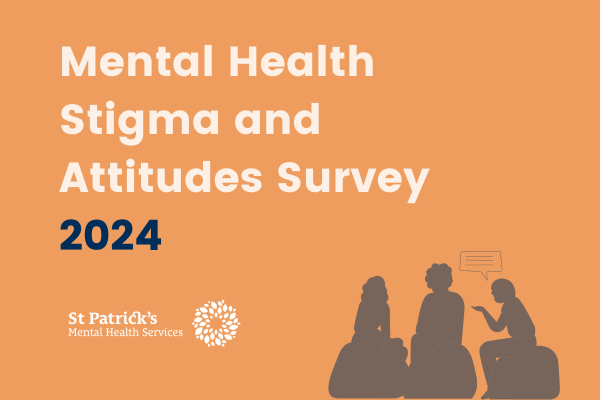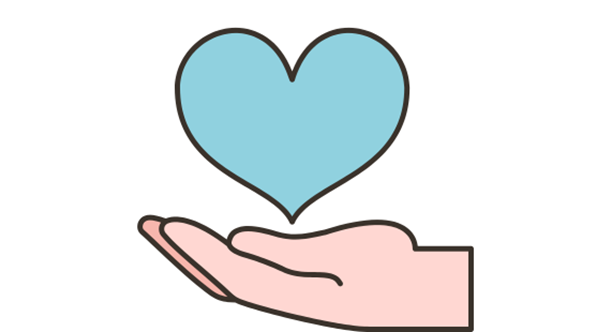
Findings from our annual mental health stigma survey show that one in five people in Ireland would tell no one if they were experiencing suicidal thoughts.
At St Patrick’s Mental Health Services (SPMHS), we recognise the importance of checking in on yourself and your loved ones year-round. However, as Christmas can be especially challenging for some, we encourage everyone to prioritize their wellbeing and the wellbeing of those around them, following the findings of our 2024 Attitudes Towards Mental Health and Stigma Survey.
The survey highlights that, while attitudes toward mental health are improving, stigma remains a significant barrier to seeking help. Embarrassment and shame continue to stop people from discussing mental health issues or seeking treatment.
Key survey findings
Prevalence of mental health difficulties
Over half (53%) of survey respondents have experienced mental health difficulties. However, more than one third (34%) did not seek treatment, with shame being the primary reason.
Perceptions of weakness
23% of people would consider it a sign of weakness if they sought help for a mental health difficulty. At the same time, 11% would consider it a sign of weakness if a friend or loved one looked for help, revealing a high level of self-stigma.
Positive trends in attitudes towards mental health
Despite some lingering stigma, findings from our 2024 survey also show areas where attitudes to mental health are improving. For a detailed look at the survey results, see the full report here.

Seeking treatment
66% of people who experienced mental health difficulties in 2024 sought treatment, up 10% from 2023

Decrease of stigma
78% of respondents believe that people with mental health challenges face less stigma than they did 10 years ago.

Disclosure
52% of people who disclosed difficulties at work, home, or in their community had positive experiences.
The importance of taking the first step
Speaking about the importance of taking that first step if you’re experiencing mental health difficulties, Seán Blake, expert by experience and a member of our Service Users and Supporters Council (SUAS), said: “I was at a very dangerous moment in my eating disorder and decided I had to speak up and ask for help or it would take me away from my family. At 42 years old and married with four kids, I was admitted to inpatient care for an eating disorder and, if I hadn’t reached out to seek support, I may not be here right now. Asking for help saved my life and led me on a journey of discovery where I learned compassion for myself, which is something that we all deserve.”
“Please check in on yourself and others. It’s so important and it can save lives; just a few words from someone can make such a difference. When I sought support, I was accepted and didn’t face stigma. Don’t let stigma win; we all deserve to be happy.”
Jude McCarthy, expert by experience and a member of SPMHS’ Service User Advisory Network (SUAN), also shared her experience with mental health stigma. “After initially being diagnosed with depression and severe anxiety, then ultimately bipolar 2 disorder 10 years later, I can now clearly see the impact that stigma—particularly self-stigma—had on me.”
“I struggled for years to accept my illness, and I spent a huge amount of time trying to find any other explanation for my symptoms, rather than seeking the additional help I desperately needed. When I finally opened up about my mental health to my GP, it was a massive relief and the first step to getting the help and information I needed to understand this illness.”
“Medication and therapy were of huge help, and I had many years symptom-free. When my illness returned many years later, stigma came too. The depression was so severe that I needed hospitalisation, but I refused the extra help time and again because hospitalisation remained the greatest stigma of all. Eventually receiving inpatient care saved and changed my life.”
“I learned that support is out there, and no one should face these challenges alone. As someone who has lived the real impact of stigma, and who nearly let it beat me, I would encourage anyone who might be struggling to reach out and speak to your GP.”
The strength in seeking help over Christmas
Speaking about the findings, Paul Gilligan, our Chief Executive Officer, said: “While attitudes towards mental health are improving in many ways, as reflected year-on-year in our annual survey findings, one concerning area that has seen little change is in the disclosure of suicidal thoughts and the idea that it’s a sign of weakness to seek help for your mental health.”
“Speaking up about your mental health takes courage. Oftentimes, a person might feel like a burden to others or that mental health difficulties may reflect a personal weakness. This is absolutely not the case, and we need to continue to challenge these deeply ingrained attitudes; to continually demonstrate the strength in speaking out and seeking help and reinforce the possibility of recovery from mental health difficulties with the right supports.”
“In the busyness of the holiday season, it’s important to remember that the most important thing we can do with our time is to connect with ourselves and our loved ones and to check in on how we are really feeling. If we ourselves, or someone we love, is struggling, don’t let stigma stand in the way of seeking support.”
See the full survey findings here
About the survey
The Annual Attitudes to Mental Health and Stigma Survey is a bespoke online survey conducted to explore the public’s awareness of, and attitudes towards, mental health in Ireland. Each year, the questionnaire is the same each year to allow for year-on-year comparisons. A nationally representative sample of over 1,000 adults aged over 18 were surveyed in 2024, with quotas set on gender, age, region, and social class.
Media queries
If you have press queries on our annual stigma survey, please contact our Communications team below.


